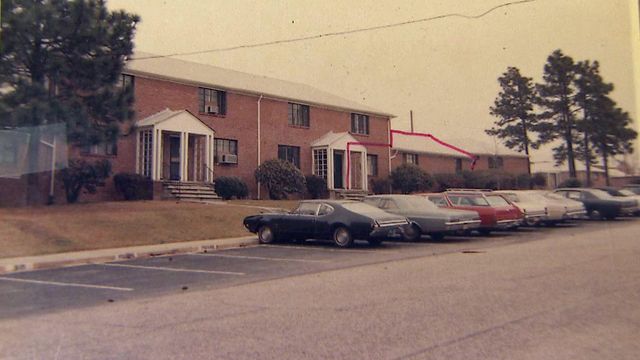Prosecutors show crime scene photos during MacDonald hearing
Prosecutors showed crime scene photos Thursday at a hearing for Jeffrey MacDonald, who was convicted of killing his pregnant wife and two daughters at their Fort Bragg home in 1970 and is seeking a new trial.
Posted — UpdatedBill Ivory, a lead investigator in the case, showed the courtroom pictures of the MacDonald apartment after the murders, including the bloodied body of Colette, MacDonald's 26-year-old wife who was 5 months pregnant with a baby boy at the time.
She was hit repeatedly in the head with a piece of wood and suffered 16 knife wounds – seven in her chest and nine in her neck – and 21 icepick wounds, according to the medical examiner. The brutal beating left her with two punctured lungs and two broken forearms, the latter of which the medical examiner described as defensive wounds.
MacDonald – now 68, remarried and still in prison – has never wavered from his claim that he didn't kill his wife and their two daughters, 5-year-old Kimberley and 2-year-old Kristen. He has maintained that he awoke on their sofa in their home as they were being attacked by four hippies – three men and a woman, who was wearing a blond wig and floppy hat as she chanted "acid is groovy, kill the pigs."
Ivory testified Thursday that he combed the crime scene "like Dick Tracy," complete with magnifying glasses, looking for clothing fibers and debris in the living room "to support what MacDonald was telling us."
"We didn't find anything in this area – no threads," Ivory said.
Investigators did find a copy of Esquire magazine on the floor, which contained an article detailing the infamous Manson murders six months earlier. Ivory said he noticed a bloody fingerprint over the "qu" on the cover of the magazine, which matched the blood types of Colette and Kimberley MacDonald.
On cross-examination, MacDonald's attorney Gordon Widenhouse asked Ivory to read sworn statements from two people who claimed that a man named Greg Mitchell confessed to the murders after MacDonald's conviction.
One of the statements said Mitchell, who died in 1982, had tearfully confessed and that feelings of guilt drove him to drink heavily. Ivory said he interviewed Mitchell in 1971, and that Mitchell said he couldn't remember where he was on the night of the murders.
Jack Crawley Jr., a law clerk and part of the prosecution team in the 1979 MacDonald trial, also testified Thursday. He disputed the story of former U.S. Marshal Jimmy Britt, who said a witness in the case, Helena Stoeckley, admitted to him that she was in the MacDonald house the night of the murders.
Crawley said Stoeckley, a known drug addict, never admitted that she had anything to do with the MacDonald murders.
Britt also claimed that he saw prosecutor Jim Blackburn threaten to indict Stoeckley with first-degree murder if she told jurors she was in the house the night of the murders, according to earlier testimony at the hearing. Crawley disputed that as well, saying that he has no memory of a federal marshal being present during the prosecution's interview with Stoeckley.
During cross examination, the MacDonald defense team questioned Crawley's record-keeping skills and asked why he had not taken notes during the interview with "this most important witness." The defense also pointed out lapses in Crawley's records in other cases.
The defense again questioned Crawley about whether Britt was there during the prosecution's interview with Stoeckley. "No, I'm not positive. I can't say with absolute certainty," he said.
Crawley was suspended by the bar in the mid-1990s for violating rules of responsibility in an unrelated case. He testified that he has a mental illness that began to set in about that time and is no longer able to practice law.
Joe McGinniss, who was embedded with MacDonald's defense team during the trial and wrote a best-selling book, "Fatal Vision," is expected to take the stand, possibly on Friday.
The hearing, which is expected to last 10 days, hinges on DNA evidence that wasn't available in 1979 and witness testimony that MacDonald's defense team says proves his innocence.
U.S. District Judge James Fox will determine if MacDonald gets a new trial.
• Credits
Copyright 2024 by WRAL.com and the Associated Press. All rights reserved. This material may not be published, broadcast, rewritten or redistributed.






